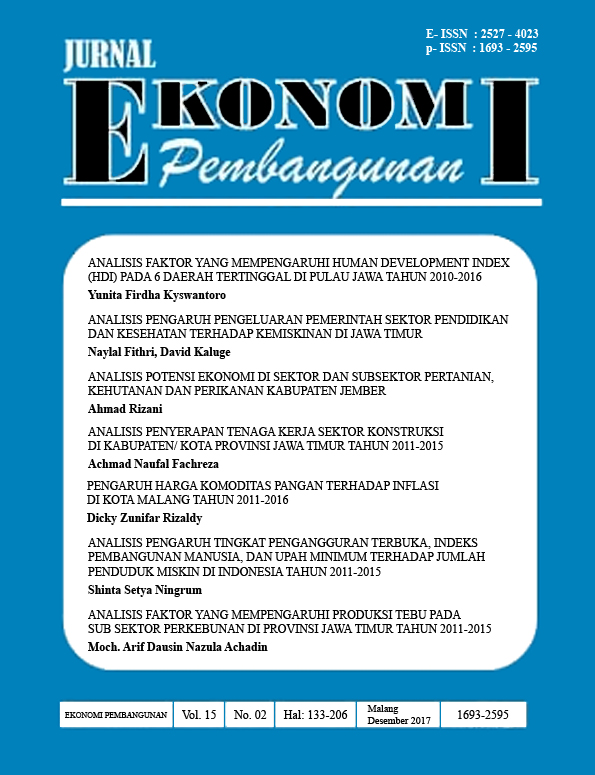ANALISIS PENGARUH TINGKAT PENGANGGURAN TERBUKA, INDEKS PEMBANGUNAN MANUSIA, DAN UPAH MINIMUM TERHADAP JUMLAH PENDUDUK MISKIN DI INDONESIA TAHUN 2011-2015
DOI:
https://doi.org/10.22219/jep.v15i2.5364Keywords:
Human Development Index, Minimum wages, Number of Poor, Open Unemployment RateAbstract
Poverty continues to be a major problem of the world, especially in developing Indonesia. The study has the objective of testing and analyzing Open Unemployment Rate, Human Development Index, and Minimum Wage for Poor People in Indonesia Year 2011-2015. This type of data uses secondary data obtained from Indonesian BPS and also the journal as research support. This research uses panel data model and use eviews9. The regression result shows that the value of Adjusted R-Square is 0.993546 which means 99.35 percent of the variation of the poor population (Y) can be explained by the independent variables in the statistical models that TPT, IPM, and minimum wage. While 0.65 percent of the variation in the number of poor people (Y) is explained by factors outside the model.
Downloads
Downloads
Published
Issue
Section
License
Authors who publish with Jurnal Ekonomi Pembangunan (JEP) agree to the following terms:
- For all articles published in Jurnal Ekonomi Pembangunan (JEP), copyright is retained by the authors. Authors permit the publisher to announce the work with conditions. When the manuscript is accepted for publication, the authors agree to the publishing right's automatic transfer to the publisher.
- Authors retain copyright and grant the journal right of first publication with the work simultaneously licensed under a Creative Commons Attribution-NonCommercial-ShareAlike 4.0 International License that allows others to share the work with an acknowledgment of the work's authorship and initial publication in this journal.
- Authors can enter into separate, additional contractual arrangements for the non-exclusive distribution of the journal's published version of the work (e.g., post it to an institutional repository or publish it in a book), with an acknowledgment of its initial publication in this journal.
- Authors are permitted and encouraged to post their work online (e.g., in institutional repositories or on their website) before and during the submission process, as it can lead to productive exchanges and earlier and greater citation of published work (See The Effect of Open Access).

This work is licensed under a Creative Commons Attribution-NonCommercial-ShareAlike 4.0 International License.






















